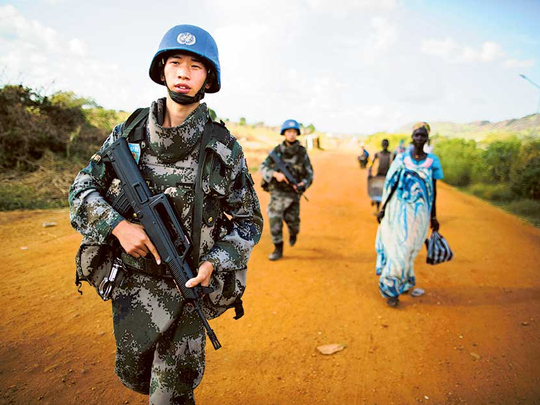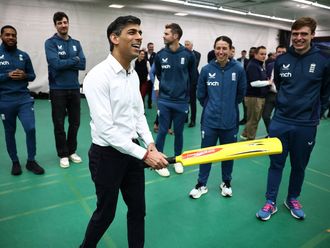
Washington: China is believed to have its sights on the United Nations’ top peacekeeping job, a position that would place a country with a questionable human rights record in charge of the world’s second-largest expeditionary force of more than 100,000 peacekeepers deployed in hot spots around the world.
While the race for a new UN secretary-general has for months grabbed most of the attention at the New York building, behind the scenes a fierce political competition is under way to land the other top posts. The outcome could shatter the monopoly that Western powers have held for decades inside the inner sanctum of UN leadership — and push peacekeeping operations in a direction human rights advocates may find worrisome.
According to multiple UN-based officials, Beijing is angling to run the Department of Peacekeeping Operations, or DPKO, which has been headed by French nationals for nearly 20 years. Moscow, for its part, is said to be hankering after the Department of Political Affairs, or DPA, which former US State Department officials have headed for the past decade.
“China is making a play for DPKO, and Russia is making a play for DPA,” one senior UN official said. “Are these just opening positions? Who knows.”
Beijing’s apparent interest in running global peacekeeping operations dovetails with its increasing evolution toward a more interventionist approach in international affairs. But it could also herald a troubling shift in how UN peacekeeping operations are conducted, with a lesser emphasis on human rights and discipline, at a time when the UN blue helmets face accusations of sexual abuse in the Central African Republic and of failing to protect persecuted civilians and aid workers in South Sudan.
“The Chinese are laying down a marker,” said Richard Gowan, a peacekeeping expert at the European Council on Foreign Relations.
“We’re seeing the first phase of a Chinese bid to, firstly, assert itself over UN peacekeeping and, secondly, to rewrite the rules of UN peacekeeping.”
China certainly has skin in the game. Operating under UN auspices, China has deployed 2,639 peacekeepers on 11 missions — more than all the other permanent members of the Security Council combined. And China just became the second-largest funder of UN peacekeeping operations after the US, chipping in more than 10 per cent of the nearly $8 billion (Dh29.4 billion) annual budget.
At a September 2015 peacekeeping summit hosted by President Barack Obama, Chinese President Xi Jinping pledged to place 8,000 troops at the disposal of a UN standby force. China also promised to train 2,000 foreign peacekeepers and committed to spending $100 million for African Union stability forces.
“Considering that China contributes more troops to the United Nations than the other permanent four members put together, that they are No 2 after the United States in terms of contributions to the peacekeeping budget, one wonders, ‘Why wouldn’t they want DPKO?’” a second senior UN official said.
But with that financial muscle comes influence: Chinese diplomats have recently tried to scale back the budget for promoting human rights in peacekeeping duty stations nominally to save money, UN diplomats say.
Like China, Russia’s interest in snagging a top UN post reflects its own return to great-power ambitions — and chafing at what both countries see as a rigged appointment system that favours the Western powers.
The US, Britain, and France have held a lock on the most influential positions in the UN Secretariat since the end of the Cold War. Herv Ladsous, a former diplomat, is the fourth French national to run the UN peacekeeping department. Stephen O’Brien, once a member of parliament for the Conservative Party, is the third British national to run the UN principal emergency relief agency.
The near-monopoly on top jobs has rankled UN reformers who say that such posts should be selected primarily on the basis of merit and not on nationality. But UN secretary-generals have found the big-power appeals hard to resist. During his first run for secretary-general in 1996, Kofi Annan faced the repeated threat of a French veto, which was lifted after Paris secured a commitment to place a French national in the top peacekeeping job. The five veto-wielding powers will expect top jobs in Guterres’ cabinet.
The informal practice of the UN Security Council’s permanent five members “conditioning their support for a candidate for secretary-general on the candidate’s willingness to secretly agree to appoint their nationals to key positions is a scandalous violation of the UN Charter,” said Bill Pace, the head of the World Federalist Movement-Institute for Global Policy, which has championed efforts to reform the selection process for UN secretary-general.
Russia hasn’t been entirely stiffed. Russian diplomats ran the UN headquarters in Geneva for nearly 20 years, from 1993 through 2011, a post that carries the rank of undersecretary-general. Yuri Fedotov, a former Russian diplomat, currently heads the UN Office on Drugs and Crime, based in Vienna. But neither of those posts wield the same kind of influence over world affairs as the senior political, security, or humanitarian relief jobs in New York.
But perhaps no permanent member of the Security Council has felt more aggrieved than China, a major world power that believes it has gotten short shrift. Its most senior post is the Department of Economic and Social Affairs, considered a second-tier UN agency.
Now, having gradually expanded its presence in peacekeeping missions over the past decade, China believes it deserves an upgrade. The Chinese Mission to the United Nations did not respond to a request for comment.












